U7 It’s raining重点知识归纳+同步练习(含答案)
文档属性
| 名称 | U7 It’s raining重点知识归纳+同步练习(含答案) | 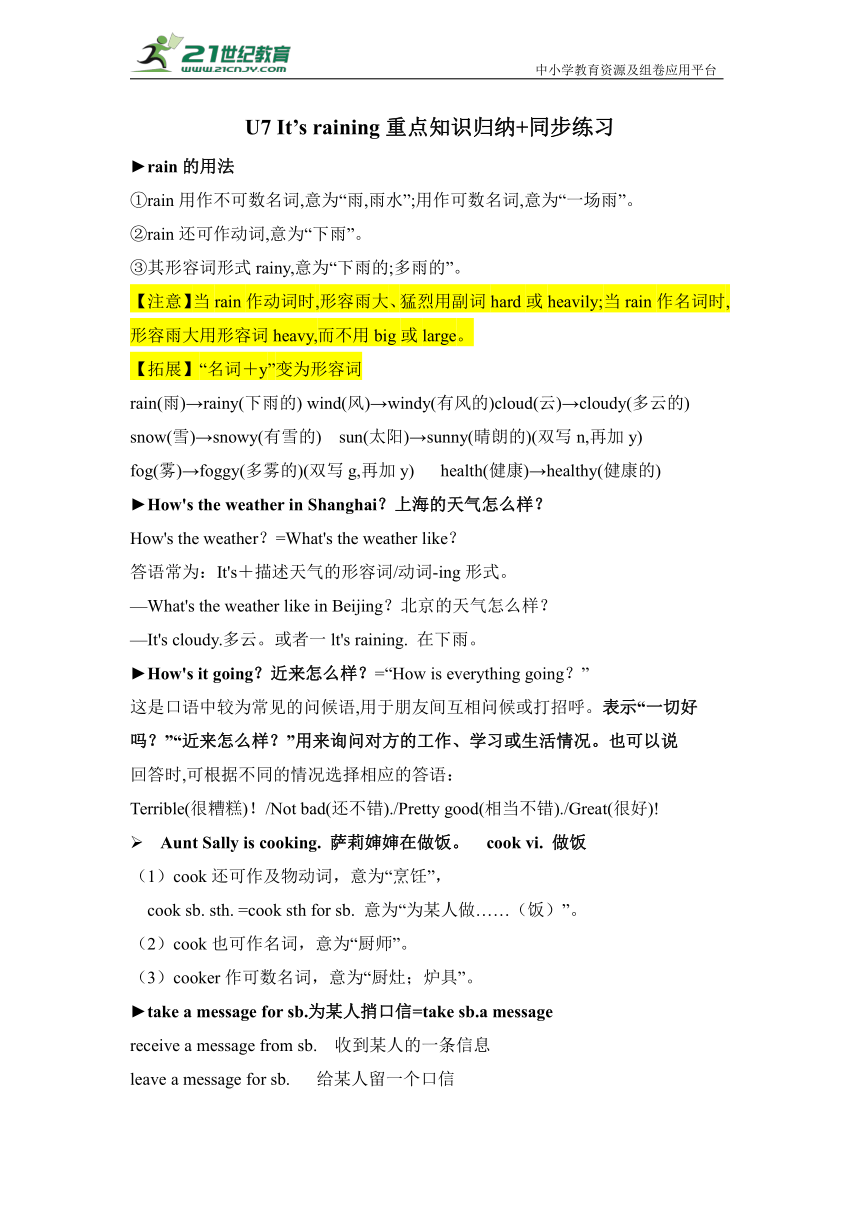 | |
| 格式 | zip | ||
| 文件大小 | 162.3KB | ||
| 资源类型 | 试卷 | ||
| 版本资源 | 人教新目标(Go for it)版 | ||
| 科目 | 英语 | ||
| 更新时间 | 2023-04-24 08:58:32 | ||
图片预览

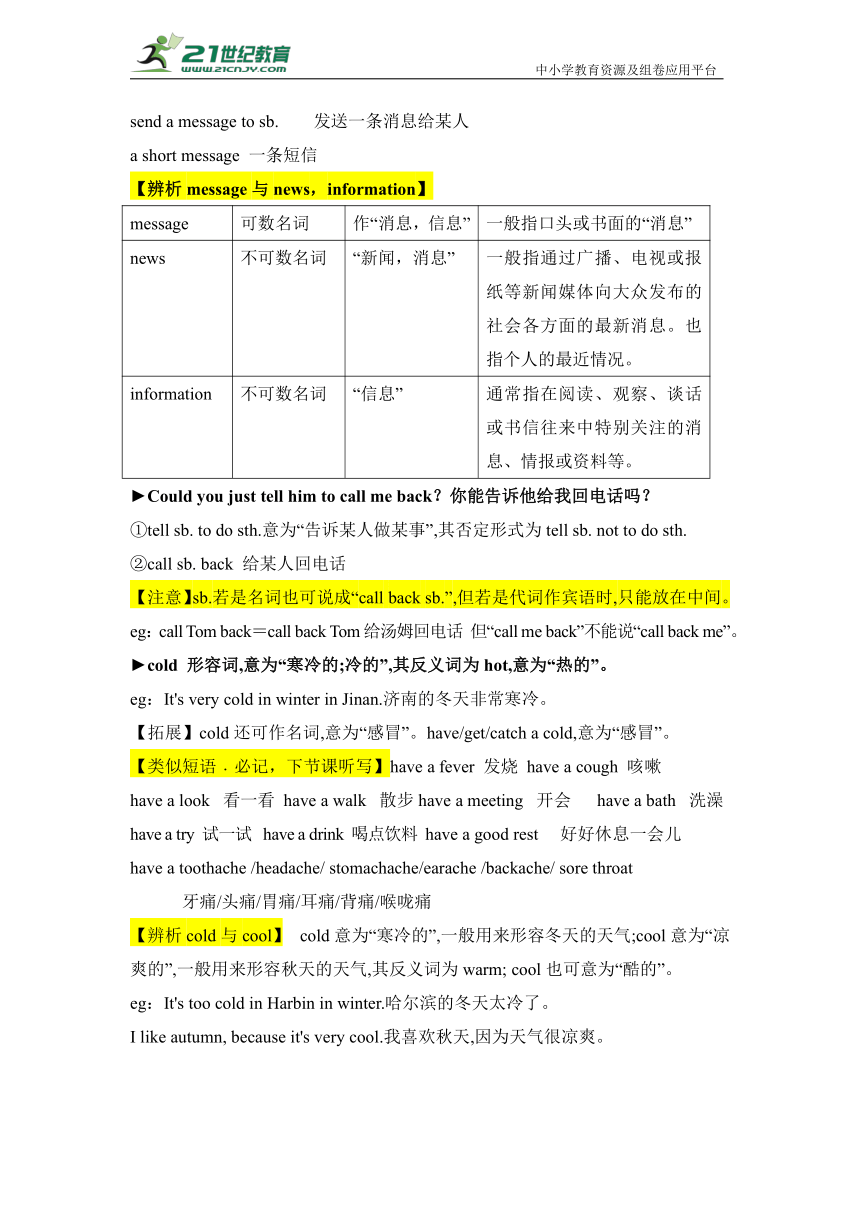
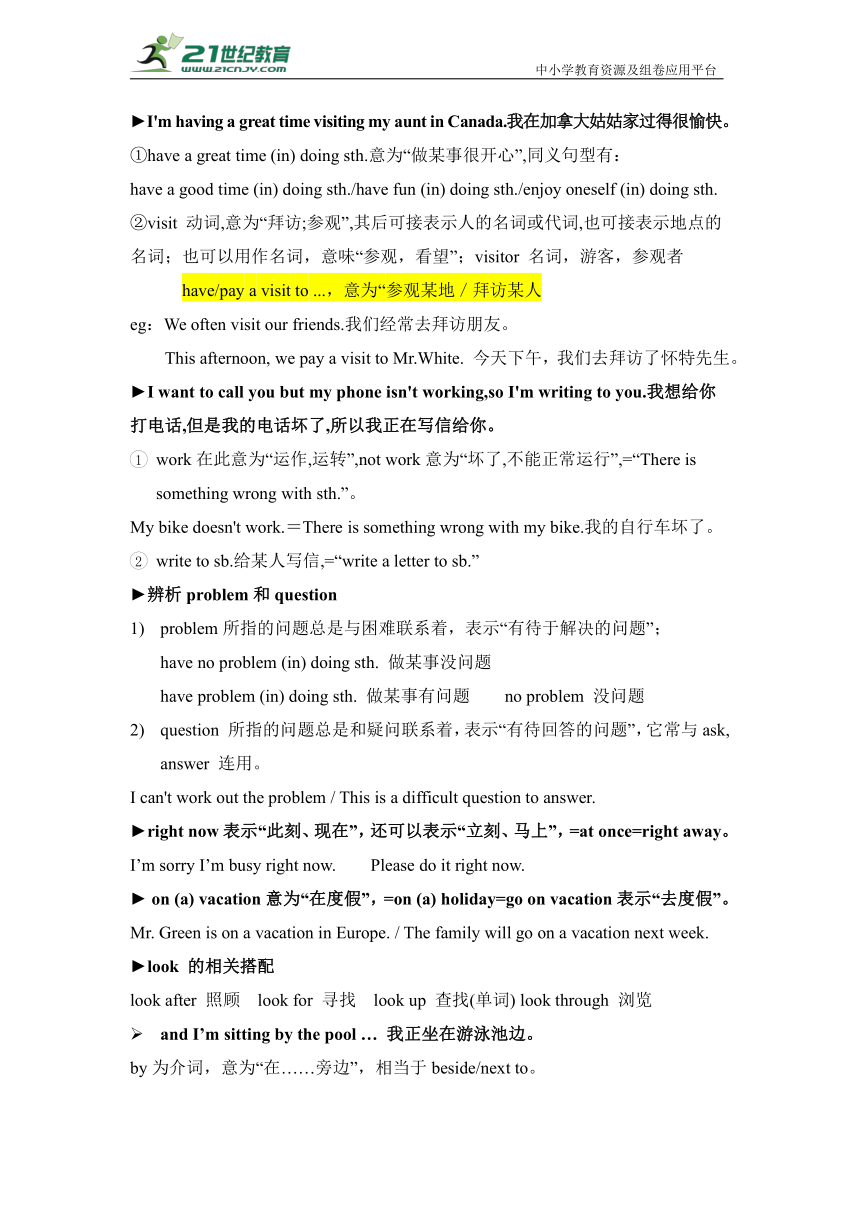
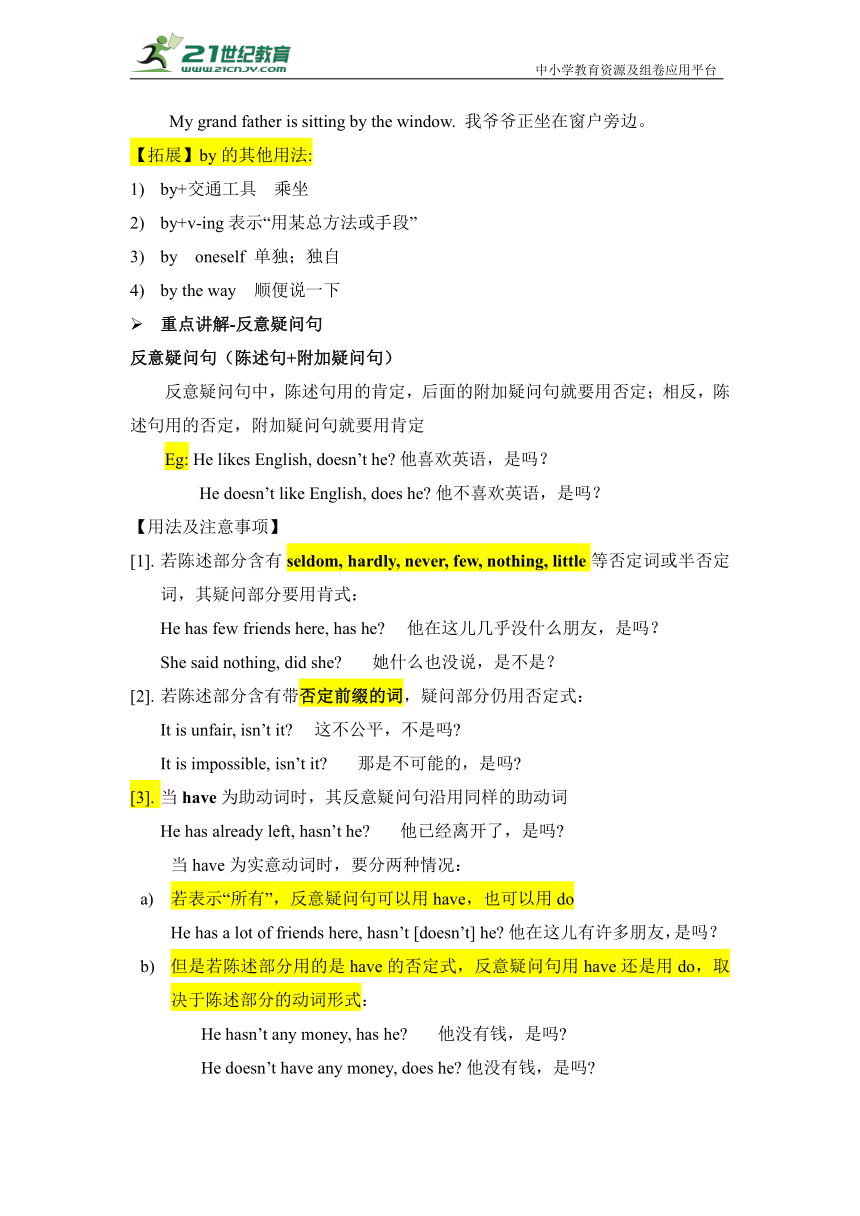
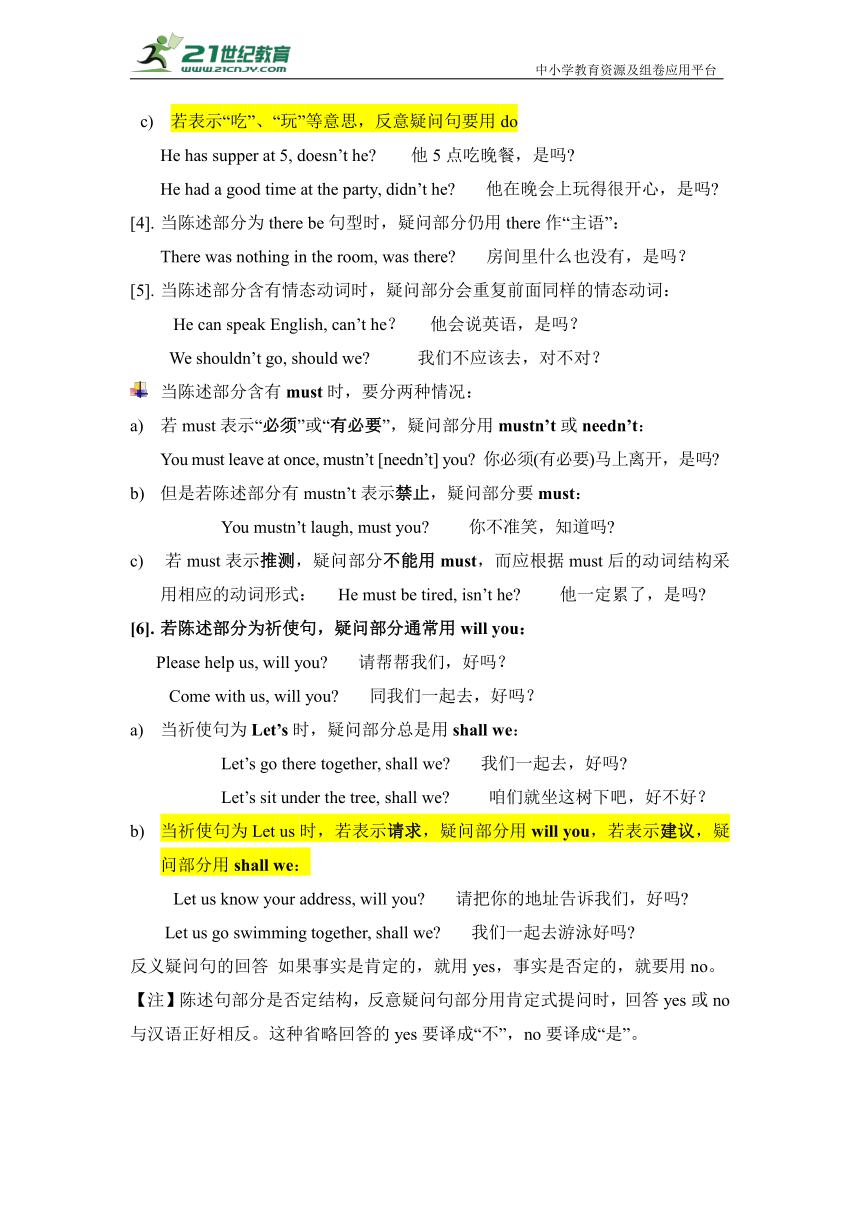
文档简介
中小学教育资源及组卷应用平台
U7 It’s raining重点知识归纳+同步练习
rain的用法
①rain用作不可数名词,意为“雨,雨水”;用作可数名词,意为“一场雨”。
②rain还可作动词,意为“下雨”。
③其形容词形式rainy,意为“下雨的;多雨的”。
【注意】当rain作动词时,形容雨大、猛烈用副词hard或heavily;当rain作名词时,形容雨大用形容词heavy,而不用big或large。
【拓展】“名词+y”变为形容词
rain(雨)→rainy(下雨的) wind(风)→windy(有风的)cloud(云)→cloudy(多云的)
snow(雪)→snowy(有雪的) sun(太阳)→sunny(晴朗的)(双写n,再加y)
fog(雾)→foggy(多雾的)(双写g,再加y) health(健康)→healthy(健康的)
How's the weather in Shanghai?上海的天气怎么样?
How's the weather?=What's the weather like?
答语常为:It's+描述天气的形容词/动词 ing形式。
—What's the weather like in Beijing?北京的天气怎么样?
—It's cloudy.多云。或者一lt's raining. 在下雨。
How's it going?近来怎么样?=“How is everything going?”
这是口语中较为常见的问候语,用于朋友间互相问候或打招呼。表示“一切好吗?”“近来怎么样?”用来询问对方的工作、学习或生活情况。也可以说
回答时,可根据不同的情况选择相应的答语:
Terrible(很糟糕)!/Not bad(还不错)./Pretty good(相当不错)./Great(很好)!
Aunt Sally is cooking. 萨莉婶婶在做饭。 cook vi. 做饭
(1)cook还可作及物动词,意为“烹饪”,
cook sb. sth. =cook sth for sb. 意为“为某人做……(饭)”。
(2)cook也可作名词,意为“厨师”。
(3)cooker作可数名词,意为“厨灶;炉具”。
take a message for sb.为某人捎口信=take sb.a message
receive a message from sb. 收到某人的一条信息
leave a message for sb. 给某人留一个口信
send a message to sb. 发送一条消息给某人
a short message 一条短信
【辨析message与news,information】
message 可数名词 作“消息,信息” 一般指口头或书面的“消息”
news 不可数名词 “新闻,消息” 一般指通过广播、电视或报纸等新闻媒体向大众发布的社会各方面的最新消息。也指个人的最近情况。
information 不可数名词 “信息” 通常指在阅读、观察、谈话或书信往来中特别关注的消息、情报或资料等。
Could you just tell him to call me back?你能告诉他给我回电话吗?
①tell sb. to do sth.意为“告诉某人做某事”,其否定形式为tell sb. not to do sth.
②call sb. back 给某人回电话
【注意】sb.若是名词也可说成“call back sb.”,但若是代词作宾语时,只能放在中间。
eg:call Tom back=call back Tom给汤姆回电话 但“call me back”不能说“call back me”。
cold 形容词,意为“寒冷的;冷的”,其反义词为hot,意为“热的”。
eg:It's very cold in winter in Jinan.济南的冬天非常寒冷。
【拓展】cold还可作名词,意为“感冒”。have/get/catch a cold,意为“感冒”。
【类似短语﹒必记,下节课听写】have a fever 发烧 have a cough 咳嗽
have a look 看一看 have a walk 散步have a meeting 开会 have a bath 洗澡
have a try 试一试 have a drink 喝点饮料 have a good rest 好好休息一会儿
have a toothache /headache/ stomachache/earache /backache/ sore throat
牙痛/头痛/胃痛/耳痛/背痛/喉咙痛
【辨析cold与cool】 cold意为“寒冷的”,一般用来形容冬天的天气;cool意为“凉爽的”,一般用来形容秋天的天气,其反义词为warm; cool也可意为“酷的”。
eg:It's too cold in Harbin in winter.哈尔滨的冬天太冷了。
I like autumn, because it's very cool.我喜欢秋天,因为天气很凉爽。
I'm having a great time visiting my aunt in Canada.我在加拿大姑姑家过得很愉快。
①have a great time (in) doing sth.意为“做某事很开心”,同义句型有:
have a good time (in) doing sth./have fun (in) doing sth./enjoy oneself (in) doing sth.
②visit 动词,意为“拜访;参观”,其后可接表示人的名词或代词,也可接表示地点的名词;也可以用作名词,意味“参观,看望”;visitor 名词,游客,参观者
have/pay a visit to ...,意为“参观某地/拜访某人
eg:We often visit our friends.我们经常去拜访朋友。
This afternoon, we pay a visit to Mr.White. 今天下午,我们去拜访了怀特先生。
I want to call you but my phone isn't working,so I'm writing to you.我想给你打电话,但是我的电话坏了,所以我正在写信给你。
work在此意为“运作,运转”,not work意为“坏了,不能正常运行”,=“There is something wrong with sth.”。
My bike doesn't work.=There is something wrong with my bike.我的自行车坏了。
write to sb.给某人写信,=“write a letter to sb.”
辨析problem和question
problem所指的问题总是与困难联系着,表示“有待于解决的问题”;
have no problem (in) doing sth. 做某事没问题
have problem (in) doing sth. 做某事有问题 no problem 没问题
question 所指的问题总是和疑问联系着,表示“有待回答的问题”,它常与ask, answer 连用。
I can't work out the problem / This is a difficult question to answer.
right now表示“此刻、现在”,还可以表示“立刻、马上”,=at once=right away。
I’m sorry I’m busy right now. Please do it right now.
on (a) vacation意为“在度假”,=on (a) holiday=go on vacation表示“去度假”。
Mr. Green is on a vacation in Europe. / The family will go on a vacation next week.
look 的相关搭配
look after 照顾 look for 寻找 look up 查找(单词) look through 浏览
and I’m sitting by the pool … 我正坐在游泳池边。
by为介词,意为“在……旁边”,相当于beside/next to。
My grand father is sitting by the window. 我爷爷正坐在窗户旁边。
【拓展】by的其他用法:
by+交通工具 乘坐
by+v-ing表示“用某总方法或手段”
by oneself 单独;独自
by the way 顺便说一下
重点讲解-反意疑问句
反意疑问句(陈述句+附加疑问句)
反意疑问句中,陈述句用的肯定,后面的附加疑问句就要用否定;相反,陈述句用的否定,附加疑问句就要用肯定
Eg: He likes English, doesn’t he 他喜欢英语,是吗?
He doesn’t like English, does he 他不喜欢英语,是吗?
【用法及注意事项】
若陈述部分含有seldom, hardly, never, few, nothing, little等否定词或半否定词,其疑问部分要用肯式:
He has few friends here, has he 他在这儿几乎没什么朋友,是吗?
She said nothing, did she 她什么也没说,是不是?
若陈述部分含有带否定前缀的词,疑问部分仍用否定式:
It is unfair, isn’t it 这不公平,不是吗
It is impossible, isn’t it 那是不可能的,是吗
当 have 为助动词时,其反意疑问句沿用同样的助动词
He has already left, hasn’t he 他已经离开了,是吗
当 have 为实意动词时,要分两种情况:
若表示“所有”,反意疑问句可以用have,也可以用do
He has a lot of friends here, hasn’t [doesn’t] he 他在这儿有许多朋友,是吗?
但是若陈述部分用的是have的否定式,反意疑问句用have 还是用do,取决于陈述部分的动词形式:
He hasn’t any money, has he 他没有钱,是吗
He doesn’t have any money, does he 他没有钱,是吗
若表示“吃”、“玩”等意思,反意疑问句要用do
He has supper at 5, doesn’t he 他5点吃晚餐,是吗
He had a good time at the party, didn’t he 他在晚会上玩得很开心,是吗
当陈述部分为there be句型时,疑问部分仍用there作“主语”:
There was nothing in the room, was there 房间里什么也没有,是吗?
当陈述部分含有情态动词时,疑问部分会重复前面同样的情态动词:
He can speak English, can’t he? 他会说英语,是吗?
We shouldn’t go, should we 我们不应该去,对不对?
当陈述部分含有must时,要分两种情况:
若must表示“必须”或“有必要”,疑问部分用 mustn’t 或needn’t:
You must leave at once, mustn’t [needn’t] you 你必须(有必要)马上离开,是吗
但是若陈述部分有mustn’t表示禁止,疑问部分要must:
You mustn’t laugh, must you 你不准笑,知道吗
若must表示推测,疑问部分不能用must,而应根据must后的动词结构采用相应的动词形式: He must be tired, isn’t he 他一定累了,是吗
若陈述部分为祈使句,疑问部分通常用will you:
Please help us, will you 请帮帮我们,好吗?
Come with us, will you 同我们一起去,好吗?
当祈使句为Let’s时,疑问部分总是用 shall we:
Let’s go there together, shall we 我们一起去,好吗
Let’s sit under the tree, shall we 咱们就坐这树下吧,好不好?
当祈使句为Let us时,若表示请求,疑问部分用will you,若表示建议,疑问部分用 shall we:
Let us know your address, will you 请把你的地址告诉我们,好吗
Let us go swimming together, shall we 我们一起去游泳好吗
反义疑问句的回答 如果事实是肯定的,就用yes,事实是否定的,就要用no。
【注】陈述句部分是否定结构,反意疑问句部分用肯定式提问时,回答yes或no与汉语正好相反。这种省略回答的yes要译成“不”,no要译成“是”。
同步练习
一、单项选择
1.My wallet is lost. I’m ________ it.
A.looking for B.looking after C.look for D.look after
2.Tom, with his classmates, ________ the windows at the moment.
A.is cleaning B.are cleaning C.cleaning D.clean
3.Some ________ people don’t feel ________ because of the bad weather.
A.ill; bad B.sick; well C.sick; bad D.ill; well
4.My brother usually ________ his classroom after school. Look! He ________ the classroom with his classmates.
A.cleans; cleans B.is cleaning; is cleaning
C.cleans; is cleaning D.is cleaning; cleans
5.It takes ________ four hours ________ Beijing by plane.
A.him, go to B.him, to get to C.his, to go D.he, to get
6.—Excuse me. I’m going to Heping Restaurant. Which bus do I need ________
—Bus No. 218.
A.to take B.taking C.to sit D.sitting
7.—How will the weather be tomorrow
—The radio says it will be ________ and ________.
A.rain, cloudy B.rainy, cloudy C.raining, cloud
8.There is lots of ________ here in summer, and I don’t like ________ days.
A.raining; rain B.rainy; raining C.rain; rainy
9.—Is Molly ________ now
—Yes. She ________ every day.
A.studying; studies hardly B.studies; studying hard C.studies; studying hardly D.studying; studies hard
10.Chongqing Zoo is such a great place that many kids have fun ________ it.
A.to visit B.visiting C.to arrive D.arriving
11.—How is the ________ in Shanghai, Tommy
—It’s sunny and hot.
A.vacation B.weather C.food D.people
12.It’s ________ to drive fast in the ________ weather.
A.excited; hot B.interest; nice C.hard; fog D.dangerous; snowy
13._________ a higher mark, he studies _________.
A.To get; hardly B.Getting; hard C.Getting; hardly D.To get; hard
14.My parents plan ________ Thailand for a holiday next month.
A.to travel B.to visit to C.visit to D.to travel to
15.Bill is looking forward _______ Shanghai with his parents.
A.to visit B.visits C.to visiting
二、完形填空
My neighborhood is not far from Sun Moon Lake(日月潭). Every weekend I ____1____ some time there. Sun Moon Lake is a beautiful ____2____. It’s in Taiwan, China. Sun Moon Lake ___3__ its name from its shape(形状). The lake ___4___ not only the sun but also the moon. So people ____5___ it Sun Moon Lake.
I like Sun Moon Lake __6___ it’s a good place to relax. From Monday to Friday I’m very busy. On weekends I’m __7____. Then I come to the beautiful and quiet lake to ____8____. I go ___9___ on the lake. I also visit some other ____10____ places around the lake. Usually, I’m here for one or two days. And then I go back to work.
1.A.miss B.love C.spend D.take
2.A.country B.river C.school D.place
3.A.takes B.brings C.has D.gets
4.A.looks like B.talks to C.likes D.looks at
5.A.call B.make C.want D.say
6.A.so B.because C.or D.and
7.A.smart B.bad C.free D.relaxing
8.A.relax B.work C.study D.walk
9.A.shopping B.boating C.walking D.swimming
10.A.boring B.interesting C.difficult D.dangerous
三、完成句子
1.Su Lin is drinking orange juice by the swimming pool.(对划线部分提问)
________ is Su Lin ________ by the swimming pool
2.My cousin will visit the zoo this Sunday.(对划线部分提问)
_________ _________ your cousin _________ this Sunday
3.It's raining and very cool in Wuhan. (对画线部分提问)
________ ________ ________ in Wuhan
4.When I passed the old man’s house, I saw that he was knocking something. (改为同义句)
When I passed the old man’s house, I saw ________ ________ something.
5.I’m going to the park. (同义句)
I’m ________ ________ ________ ________ the park.
6.I will show you around my hometown. (改为同义句)
I’ll ________ you ________ ________ my hometown
7.What do you like about the summer camping (同义句转换)
_________________________________________
8.It often rains. (变成同义句)
It ________ often ________.
9.This is my first visit to West Lake. (改为同义句)
This is my first time ________ ________ West Lake.
10.To walk from your home to mine is not hard. (改为同义句)
_______ _______ ________ ________ ________ from your home to mine.
11.We are having fun in the park. (改为同义句)
We are ________ ________ ________ ________ in the park.
12.The bike costs Sally 2,000 yuan. (改为同义句)
Sally ________ 2,000 yuan for the bike.
Sally ________ 2,000 yuan on the bike.
13.Sometimes he sits in front of the building.(用now改句)
He ________ ________ in front of the building now.
14.The wind is blowing very hard. (改为感叹句)
________ ________ the wind is blowing!
15.How’s the weather in your village (改为同义句)
________ the weather ________ in your village
16.Are you having a good time at the party (改为同义句)
Are you ________ ________ at the party
17.Are you doing your homework (用watch TV改为选择疑问句)
Are you doing your homework ________ ________ TV
18.Tom is playing tennis with his brother. (对划线部分提问)
________ is Tom ________ tennis with
19.The old woman always sits by the pool. (对划线部分提问)
________ ________ the old woman always sit
20.He does his homework every day. (变为一般疑问句)
_ _he _____ his homework every day
四、短文填空
The weather is probably the best subject to start a conversation in England because it often c (1).
Summer is a pleasant s (2).The sun shines.There's no wind and there are no clouds in the s (3).It is possible for people to walk and play in the open air.or go to the seaside to have a r (4)there.The average temperature is about 55.5 degrees a (5)zero.The days are long and get dark late.
When fall comes, the days get s (6)and become cooler.The sky is often cloudy. A real Englishman usually b (7)an umbrella with him.
Snow is very late in Britain.In the south snow melts very q (8)in 2 or 3 hours. Winter is often windy and rainy l (9)fall.
Spring brings sunshine. People usually say"A n (10)day, isn'tit if it is sunny. It's usual way to start a conversation.
反意疑问句专题训练
( )Zhou Ming has few English magazines, ________
A.does he B.doesn’t he C.has he D.hasn’t he
( )Cindy could hardly speak English three years ago, ________
A. couldn't she B. could she C. can she
( )Alice had a wonderful time yesterday, _______
A. hadn’t she B. wasn’t she C. didn’t she D. wouldn’t she
( )–She didn’t come to school yesterday, did she
–______, though she was not feeling well.
A. No, she didn’t B. Yes, she didn’t C. No, she did D. Yes, she did
( )---He hardly spent any time on his subjects, ________
---________, so he does badly in his lessons.
A .didn’t he, Yes B. did he, Yes C. didn’t he, No D. did he, No
( )He has read this book before,
A. hasn’t he B. doesn’t he C. isn’t he D. wasn’t he
( )– Let’s go for a walk, ______
–OK, I’m coming . Don’t forget to bring your camera, ______
A. will you; will you B. will you; shall we
C. shall we; shall we D. shall we; will you
( )John had a short walk after lunch, ________?
A. did he B. didn't he C. had he D. hadn't he
( )Nancy hardly rings you up, ___________
A. doesn’t she B. does she C. doesn’t Nancy D. does Nancy
( )---Your brother often disagrees with you, _______ he
--- _______. We often have different opinions.
A.does; Yes B. doesn’t ;Yes C. does; No D. doesn’t; No
( )Kate’s never late for school,
A.isn’t she B.hasn’the C.is she D.has she
( )--- Liu Tao has never read the book The Adventure of Tom Sawyer , -__ he --- _____. He told me it's very interesting. He'd like to read it again.
A. is; No, he isn't B. has; Yes, he has C. isn’t; Yes, he is D. hasn’t; No, he hasn't
( )—He’s never late for school, _____ —No, he isn’t .He is always very early.
A. is he B. isn’t he C. hasn’t he D. has he
( )—There’s little meat left in the fridge, ________
—________. I’ll get some on my way home.
A. is there, Yes B. isn’t there, Yes C. is there, No D. isn’t there, No
( )—Tom finished his homework, didn’t he
—___, though he was ill yesterday.
A. No, he didn’t B. Yes, he did C. Yes, he does D. No, he doesn’t
( )There is little water in the cup,
A. is there B. isn’t there C. isn’t it D. is it
( )You have never visited the place before, you
A. did B. didn’t C. have D. haven’t
( )Don't keep poison in the kitchen, _______
A. do you B. shall we C. will you D. don't you
( )There are no museums in our city, _________
A. aren’t there B. are there C. is there D. isn’t there
( )Your father is playing the piano very well, he
A.is B.isn’t C.does D.doesn’t
( )— It’s her birthday tomorrow, ____ -Yes, let’s have a surprise party for her.
A. isn’t it B. isn’t she C. doesn’t it D. doesn’t she
( )--- He has never stolen anything before, _______ he
--- ________. It’s his third time to be taken to the police station.
A. hasn’t; Yes B. has; No C. has; Yes D. is; No
( )Good, you have done it well! You need no more help from us, ______.
A. do you B. need you C. don’t you D. needn’t you
答案:
单项选择
AABCB ABCDB BDDDC
完形填空
CDDAA BCABB
完成句子
What doing;What will visit;How's the weather;him knocking;going to go to; take to visit;Why do you like the summer camping; is rainy; to visit;It’s not hard to walk; having a good/great time;pays spends;is sitting; How hard;
What’s like ; having fun ; or watching ; Who playing ; Where does ; Does do
短文填空
changes season sky rest above shorter brings quickly like nice
反意疑问句专题训练
ABCDD ADBBB CBACB ACCBB ACA
U7 It’s raining重点知识归纳+同步练习
rain的用法
①rain用作不可数名词,意为“雨,雨水”;用作可数名词,意为“一场雨”。
②rain还可作动词,意为“下雨”。
③其形容词形式rainy,意为“下雨的;多雨的”。
【注意】当rain作动词时,形容雨大、猛烈用副词hard或heavily;当rain作名词时,形容雨大用形容词heavy,而不用big或large。
【拓展】“名词+y”变为形容词
rain(雨)→rainy(下雨的) wind(风)→windy(有风的)cloud(云)→cloudy(多云的)
snow(雪)→snowy(有雪的) sun(太阳)→sunny(晴朗的)(双写n,再加y)
fog(雾)→foggy(多雾的)(双写g,再加y) health(健康)→healthy(健康的)
How's the weather in Shanghai?上海的天气怎么样?
How's the weather?=What's the weather like?
答语常为:It's+描述天气的形容词/动词 ing形式。
—What's the weather like in Beijing?北京的天气怎么样?
—It's cloudy.多云。或者一lt's raining. 在下雨。
How's it going?近来怎么样?=“How is everything going?”
这是口语中较为常见的问候语,用于朋友间互相问候或打招呼。表示“一切好吗?”“近来怎么样?”用来询问对方的工作、学习或生活情况。也可以说
回答时,可根据不同的情况选择相应的答语:
Terrible(很糟糕)!/Not bad(还不错)./Pretty good(相当不错)./Great(很好)!
Aunt Sally is cooking. 萨莉婶婶在做饭。 cook vi. 做饭
(1)cook还可作及物动词,意为“烹饪”,
cook sb. sth. =cook sth for sb. 意为“为某人做……(饭)”。
(2)cook也可作名词,意为“厨师”。
(3)cooker作可数名词,意为“厨灶;炉具”。
take a message for sb.为某人捎口信=take sb.a message
receive a message from sb. 收到某人的一条信息
leave a message for sb. 给某人留一个口信
send a message to sb. 发送一条消息给某人
a short message 一条短信
【辨析message与news,information】
message 可数名词 作“消息,信息” 一般指口头或书面的“消息”
news 不可数名词 “新闻,消息” 一般指通过广播、电视或报纸等新闻媒体向大众发布的社会各方面的最新消息。也指个人的最近情况。
information 不可数名词 “信息” 通常指在阅读、观察、谈话或书信往来中特别关注的消息、情报或资料等。
Could you just tell him to call me back?你能告诉他给我回电话吗?
①tell sb. to do sth.意为“告诉某人做某事”,其否定形式为tell sb. not to do sth.
②call sb. back 给某人回电话
【注意】sb.若是名词也可说成“call back sb.”,但若是代词作宾语时,只能放在中间。
eg:call Tom back=call back Tom给汤姆回电话 但“call me back”不能说“call back me”。
cold 形容词,意为“寒冷的;冷的”,其反义词为hot,意为“热的”。
eg:It's very cold in winter in Jinan.济南的冬天非常寒冷。
【拓展】cold还可作名词,意为“感冒”。have/get/catch a cold,意为“感冒”。
【类似短语﹒必记,下节课听写】have a fever 发烧 have a cough 咳嗽
have a look 看一看 have a walk 散步have a meeting 开会 have a bath 洗澡
have a try 试一试 have a drink 喝点饮料 have a good rest 好好休息一会儿
have a toothache /headache/ stomachache/earache /backache/ sore throat
牙痛/头痛/胃痛/耳痛/背痛/喉咙痛
【辨析cold与cool】 cold意为“寒冷的”,一般用来形容冬天的天气;cool意为“凉爽的”,一般用来形容秋天的天气,其反义词为warm; cool也可意为“酷的”。
eg:It's too cold in Harbin in winter.哈尔滨的冬天太冷了。
I like autumn, because it's very cool.我喜欢秋天,因为天气很凉爽。
I'm having a great time visiting my aunt in Canada.我在加拿大姑姑家过得很愉快。
①have a great time (in) doing sth.意为“做某事很开心”,同义句型有:
have a good time (in) doing sth./have fun (in) doing sth./enjoy oneself (in) doing sth.
②visit 动词,意为“拜访;参观”,其后可接表示人的名词或代词,也可接表示地点的名词;也可以用作名词,意味“参观,看望”;visitor 名词,游客,参观者
have/pay a visit to ...,意为“参观某地/拜访某人
eg:We often visit our friends.我们经常去拜访朋友。
This afternoon, we pay a visit to Mr.White. 今天下午,我们去拜访了怀特先生。
I want to call you but my phone isn't working,so I'm writing to you.我想给你打电话,但是我的电话坏了,所以我正在写信给你。
work在此意为“运作,运转”,not work意为“坏了,不能正常运行”,=“There is something wrong with sth.”。
My bike doesn't work.=There is something wrong with my bike.我的自行车坏了。
write to sb.给某人写信,=“write a letter to sb.”
辨析problem和question
problem所指的问题总是与困难联系着,表示“有待于解决的问题”;
have no problem (in) doing sth. 做某事没问题
have problem (in) doing sth. 做某事有问题 no problem 没问题
question 所指的问题总是和疑问联系着,表示“有待回答的问题”,它常与ask, answer 连用。
I can't work out the problem / This is a difficult question to answer.
right now表示“此刻、现在”,还可以表示“立刻、马上”,=at once=right away。
I’m sorry I’m busy right now. Please do it right now.
on (a) vacation意为“在度假”,=on (a) holiday=go on vacation表示“去度假”。
Mr. Green is on a vacation in Europe. / The family will go on a vacation next week.
look 的相关搭配
look after 照顾 look for 寻找 look up 查找(单词) look through 浏览
and I’m sitting by the pool … 我正坐在游泳池边。
by为介词,意为“在……旁边”,相当于beside/next to。
My grand father is sitting by the window. 我爷爷正坐在窗户旁边。
【拓展】by的其他用法:
by+交通工具 乘坐
by+v-ing表示“用某总方法或手段”
by oneself 单独;独自
by the way 顺便说一下
重点讲解-反意疑问句
反意疑问句(陈述句+附加疑问句)
反意疑问句中,陈述句用的肯定,后面的附加疑问句就要用否定;相反,陈述句用的否定,附加疑问句就要用肯定
Eg: He likes English, doesn’t he 他喜欢英语,是吗?
He doesn’t like English, does he 他不喜欢英语,是吗?
【用法及注意事项】
若陈述部分含有seldom, hardly, never, few, nothing, little等否定词或半否定词,其疑问部分要用肯式:
He has few friends here, has he 他在这儿几乎没什么朋友,是吗?
She said nothing, did she 她什么也没说,是不是?
若陈述部分含有带否定前缀的词,疑问部分仍用否定式:
It is unfair, isn’t it 这不公平,不是吗
It is impossible, isn’t it 那是不可能的,是吗
当 have 为助动词时,其反意疑问句沿用同样的助动词
He has already left, hasn’t he 他已经离开了,是吗
当 have 为实意动词时,要分两种情况:
若表示“所有”,反意疑问句可以用have,也可以用do
He has a lot of friends here, hasn’t [doesn’t] he 他在这儿有许多朋友,是吗?
但是若陈述部分用的是have的否定式,反意疑问句用have 还是用do,取决于陈述部分的动词形式:
He hasn’t any money, has he 他没有钱,是吗
He doesn’t have any money, does he 他没有钱,是吗
若表示“吃”、“玩”等意思,反意疑问句要用do
He has supper at 5, doesn’t he 他5点吃晚餐,是吗
He had a good time at the party, didn’t he 他在晚会上玩得很开心,是吗
当陈述部分为there be句型时,疑问部分仍用there作“主语”:
There was nothing in the room, was there 房间里什么也没有,是吗?
当陈述部分含有情态动词时,疑问部分会重复前面同样的情态动词:
He can speak English, can’t he? 他会说英语,是吗?
We shouldn’t go, should we 我们不应该去,对不对?
当陈述部分含有must时,要分两种情况:
若must表示“必须”或“有必要”,疑问部分用 mustn’t 或needn’t:
You must leave at once, mustn’t [needn’t] you 你必须(有必要)马上离开,是吗
但是若陈述部分有mustn’t表示禁止,疑问部分要must:
You mustn’t laugh, must you 你不准笑,知道吗
若must表示推测,疑问部分不能用must,而应根据must后的动词结构采用相应的动词形式: He must be tired, isn’t he 他一定累了,是吗
若陈述部分为祈使句,疑问部分通常用will you:
Please help us, will you 请帮帮我们,好吗?
Come with us, will you 同我们一起去,好吗?
当祈使句为Let’s时,疑问部分总是用 shall we:
Let’s go there together, shall we 我们一起去,好吗
Let’s sit under the tree, shall we 咱们就坐这树下吧,好不好?
当祈使句为Let us时,若表示请求,疑问部分用will you,若表示建议,疑问部分用 shall we:
Let us know your address, will you 请把你的地址告诉我们,好吗
Let us go swimming together, shall we 我们一起去游泳好吗
反义疑问句的回答 如果事实是肯定的,就用yes,事实是否定的,就要用no。
【注】陈述句部分是否定结构,反意疑问句部分用肯定式提问时,回答yes或no与汉语正好相反。这种省略回答的yes要译成“不”,no要译成“是”。
同步练习
一、单项选择
1.My wallet is lost. I’m ________ it.
A.looking for B.looking after C.look for D.look after
2.Tom, with his classmates, ________ the windows at the moment.
A.is cleaning B.are cleaning C.cleaning D.clean
3.Some ________ people don’t feel ________ because of the bad weather.
A.ill; bad B.sick; well C.sick; bad D.ill; well
4.My brother usually ________ his classroom after school. Look! He ________ the classroom with his classmates.
A.cleans; cleans B.is cleaning; is cleaning
C.cleans; is cleaning D.is cleaning; cleans
5.It takes ________ four hours ________ Beijing by plane.
A.him, go to B.him, to get to C.his, to go D.he, to get
6.—Excuse me. I’m going to Heping Restaurant. Which bus do I need ________
—Bus No. 218.
A.to take B.taking C.to sit D.sitting
7.—How will the weather be tomorrow
—The radio says it will be ________ and ________.
A.rain, cloudy B.rainy, cloudy C.raining, cloud
8.There is lots of ________ here in summer, and I don’t like ________ days.
A.raining; rain B.rainy; raining C.rain; rainy
9.—Is Molly ________ now
—Yes. She ________ every day.
A.studying; studies hardly B.studies; studying hard C.studies; studying hardly D.studying; studies hard
10.Chongqing Zoo is such a great place that many kids have fun ________ it.
A.to visit B.visiting C.to arrive D.arriving
11.—How is the ________ in Shanghai, Tommy
—It’s sunny and hot.
A.vacation B.weather C.food D.people
12.It’s ________ to drive fast in the ________ weather.
A.excited; hot B.interest; nice C.hard; fog D.dangerous; snowy
13._________ a higher mark, he studies _________.
A.To get; hardly B.Getting; hard C.Getting; hardly D.To get; hard
14.My parents plan ________ Thailand for a holiday next month.
A.to travel B.to visit to C.visit to D.to travel to
15.Bill is looking forward _______ Shanghai with his parents.
A.to visit B.visits C.to visiting
二、完形填空
My neighborhood is not far from Sun Moon Lake(日月潭). Every weekend I ____1____ some time there. Sun Moon Lake is a beautiful ____2____. It’s in Taiwan, China. Sun Moon Lake ___3__ its name from its shape(形状). The lake ___4___ not only the sun but also the moon. So people ____5___ it Sun Moon Lake.
I like Sun Moon Lake __6___ it’s a good place to relax. From Monday to Friday I’m very busy. On weekends I’m __7____. Then I come to the beautiful and quiet lake to ____8____. I go ___9___ on the lake. I also visit some other ____10____ places around the lake. Usually, I’m here for one or two days. And then I go back to work.
1.A.miss B.love C.spend D.take
2.A.country B.river C.school D.place
3.A.takes B.brings C.has D.gets
4.A.looks like B.talks to C.likes D.looks at
5.A.call B.make C.want D.say
6.A.so B.because C.or D.and
7.A.smart B.bad C.free D.relaxing
8.A.relax B.work C.study D.walk
9.A.shopping B.boating C.walking D.swimming
10.A.boring B.interesting C.difficult D.dangerous
三、完成句子
1.Su Lin is drinking orange juice by the swimming pool.(对划线部分提问)
________ is Su Lin ________ by the swimming pool
2.My cousin will visit the zoo this Sunday.(对划线部分提问)
_________ _________ your cousin _________ this Sunday
3.It's raining and very cool in Wuhan. (对画线部分提问)
________ ________ ________ in Wuhan
4.When I passed the old man’s house, I saw that he was knocking something. (改为同义句)
When I passed the old man’s house, I saw ________ ________ something.
5.I’m going to the park. (同义句)
I’m ________ ________ ________ ________ the park.
6.I will show you around my hometown. (改为同义句)
I’ll ________ you ________ ________ my hometown
7.What do you like about the summer camping (同义句转换)
_________________________________________
8.It often rains. (变成同义句)
It ________ often ________.
9.This is my first visit to West Lake. (改为同义句)
This is my first time ________ ________ West Lake.
10.To walk from your home to mine is not hard. (改为同义句)
_______ _______ ________ ________ ________ from your home to mine.
11.We are having fun in the park. (改为同义句)
We are ________ ________ ________ ________ in the park.
12.The bike costs Sally 2,000 yuan. (改为同义句)
Sally ________ 2,000 yuan for the bike.
Sally ________ 2,000 yuan on the bike.
13.Sometimes he sits in front of the building.(用now改句)
He ________ ________ in front of the building now.
14.The wind is blowing very hard. (改为感叹句)
________ ________ the wind is blowing!
15.How’s the weather in your village (改为同义句)
________ the weather ________ in your village
16.Are you having a good time at the party (改为同义句)
Are you ________ ________ at the party
17.Are you doing your homework (用watch TV改为选择疑问句)
Are you doing your homework ________ ________ TV
18.Tom is playing tennis with his brother. (对划线部分提问)
________ is Tom ________ tennis with
19.The old woman always sits by the pool. (对划线部分提问)
________ ________ the old woman always sit
20.He does his homework every day. (变为一般疑问句)
_ _he _____ his homework every day
四、短文填空
The weather is probably the best subject to start a conversation in England because it often c (1).
Summer is a pleasant s (2).The sun shines.There's no wind and there are no clouds in the s (3).It is possible for people to walk and play in the open air.or go to the seaside to have a r (4)there.The average temperature is about 55.5 degrees a (5)zero.The days are long and get dark late.
When fall comes, the days get s (6)and become cooler.The sky is often cloudy. A real Englishman usually b (7)an umbrella with him.
Snow is very late in Britain.In the south snow melts very q (8)in 2 or 3 hours. Winter is often windy and rainy l (9)fall.
Spring brings sunshine. People usually say"A n (10)day, isn'tit if it is sunny. It's usual way to start a conversation.
反意疑问句专题训练
( )Zhou Ming has few English magazines, ________
A.does he B.doesn’t he C.has he D.hasn’t he
( )Cindy could hardly speak English three years ago, ________
A. couldn't she B. could she C. can she
( )Alice had a wonderful time yesterday, _______
A. hadn’t she B. wasn’t she C. didn’t she D. wouldn’t she
( )–She didn’t come to school yesterday, did she
–______, though she was not feeling well.
A. No, she didn’t B. Yes, she didn’t C. No, she did D. Yes, she did
( )---He hardly spent any time on his subjects, ________
---________, so he does badly in his lessons.
A .didn’t he, Yes B. did he, Yes C. didn’t he, No D. did he, No
( )He has read this book before,
A. hasn’t he B. doesn’t he C. isn’t he D. wasn’t he
( )– Let’s go for a walk, ______
–OK, I’m coming . Don’t forget to bring your camera, ______
A. will you; will you B. will you; shall we
C. shall we; shall we D. shall we; will you
( )John had a short walk after lunch, ________?
A. did he B. didn't he C. had he D. hadn't he
( )Nancy hardly rings you up, ___________
A. doesn’t she B. does she C. doesn’t Nancy D. does Nancy
( )---Your brother often disagrees with you, _______ he
--- _______. We often have different opinions.
A.does; Yes B. doesn’t ;Yes C. does; No D. doesn’t; No
( )Kate’s never late for school,
A.isn’t she B.hasn’the C.is she D.has she
( )--- Liu Tao has never read the book The Adventure of Tom Sawyer , -__ he --- _____. He told me it's very interesting. He'd like to read it again.
A. is; No, he isn't B. has; Yes, he has C. isn’t; Yes, he is D. hasn’t; No, he hasn't
( )—He’s never late for school, _____ —No, he isn’t .He is always very early.
A. is he B. isn’t he C. hasn’t he D. has he
( )—There’s little meat left in the fridge, ________
—________. I’ll get some on my way home.
A. is there, Yes B. isn’t there, Yes C. is there, No D. isn’t there, No
( )—Tom finished his homework, didn’t he
—___, though he was ill yesterday.
A. No, he didn’t B. Yes, he did C. Yes, he does D. No, he doesn’t
( )There is little water in the cup,
A. is there B. isn’t there C. isn’t it D. is it
( )You have never visited the place before, you
A. did B. didn’t C. have D. haven’t
( )Don't keep poison in the kitchen, _______
A. do you B. shall we C. will you D. don't you
( )There are no museums in our city, _________
A. aren’t there B. are there C. is there D. isn’t there
( )Your father is playing the piano very well, he
A.is B.isn’t C.does D.doesn’t
( )— It’s her birthday tomorrow, ____ -Yes, let’s have a surprise party for her.
A. isn’t it B. isn’t she C. doesn’t it D. doesn’t she
( )--- He has never stolen anything before, _______ he
--- ________. It’s his third time to be taken to the police station.
A. hasn’t; Yes B. has; No C. has; Yes D. is; No
( )Good, you have done it well! You need no more help from us, ______.
A. do you B. need you C. don’t you D. needn’t you
答案:
单项选择
AABCB ABCDB BDDDC
完形填空
CDDAA BCABB
完成句子
What doing;What will visit;How's the weather;him knocking;going to go to; take to visit;Why do you like the summer camping; is rainy; to visit;It’s not hard to walk; having a good/great time;pays spends;is sitting; How hard;
What’s like ; having fun ; or watching ; Who playing ; Where does ; Does do
短文填空
changes season sky rest above shorter brings quickly like nice
反意疑问句专题训练
ABCDD ADBBB CBACB ACCBB ACA
同课章节目录
- Unit 1 Can you play the guitar?
- Section A
- Section B
- Unit 2 What time do you go to school?
- Section A
- Section B
- Unit 3 How do you get to school?
- Section A
- Section B
- Unit 4 Don't eat in class.
- Section A
- Section B
- Unit 5 Why do you like pandas?
- Section A
- Section B
- Unit 6 I'm watching TV.
- Section A
- Section B
- Review of Units 1-6
- Unit 7 It's raining!
- Section A
- Section B
- Unit 8 Is there a post office near here?
- Section A
- Section B
- Unit 9 What does he look like?
- Section A
- Section B
- Unit 10 I'd like some noodles.
- Section A
- Section B
- Unit 11 How was your school trip?
- Section A
- Section B
- Unit 12 What did you do last weekend?
- Section A
- Section B
